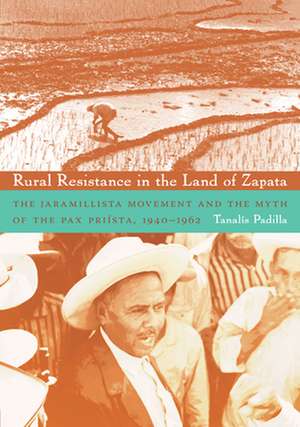Rural Resistance in the Land of Zapata – The Jaramillista Movement and the Myth of the Pax Priísta, 1940–1962
Autor Tanalís Padillaen Limba Engleză Paperback – 6 noi 2008
The Jaramillistas fought persistently through legal channels for access to land, the means to work it, and sustainable prices for their products, but the Mexican government increasingly closed its doors to rural reform. The government ultimately responded with repression, pushing the Jaramillistas into armed struggle, and transforming their calls for local reform into a broader critique of capitalism. With "Rural Resistance in the Land of Zapata," Padilla sheds new light on the decision to initiate armed struggle, women's challenges to patriarchal norms, and the ways that campesinos framed their demands in relation to national and international political developments.
Preț: 212.98 lei
Nou
Puncte Express: 319
Preț estimativ în valută:
40.76€ • 42.11$ • 33.92£
40.76€ • 42.11$ • 33.92£
Carte tipărită la comandă
Livrare economică 26 martie-09 aprilie
Preluare comenzi: 021 569.72.76
Specificații
ISBN-13: 9780822343196
ISBN-10: 0822343193
Pagini: 288
Ilustrații: 13 illustrations
Dimensiuni: 156 x 224 x 23 mm
Greutate: 0.57 kg
Editura: Wiley
ISBN-10: 0822343193
Pagini: 288
Ilustrații: 13 illustrations
Dimensiuni: 156 x 224 x 23 mm
Greutate: 0.57 kg
Editura: Wiley
Cuprins
Acknowledgments vii
Introduction 1
1. The Ghost of Zapata 26
2. Jaramillo, Cárdenas, and the Emiliano Zapata Cooperative 55
3. The Agrarista Tradition 85
4. "Like Juárez, with Our Offices on the Run" 108
5. "They Made Him into a Rebel" 139
6. Gender, Community, and Struggle 161
7. Judas's Embrace 184
Conclusion: The Jaramillista Legacy 211
Notes 225
Bibliography 263
Index 279
Introduction 1
1. The Ghost of Zapata 26
2. Jaramillo, Cárdenas, and the Emiliano Zapata Cooperative 55
3. The Agrarista Tradition 85
4. "Like Juárez, with Our Offices on the Run" 108
5. "They Made Him into a Rebel" 139
6. Gender, Community, and Struggle 161
7. Judas's Embrace 184
Conclusion: The Jaramillista Legacy 211
Notes 225
Bibliography 263
Index 279
Recenzii
Rural Resistance in the Land of Zapata sets a new standard for historical studies of Mexican social protest and state repression after 1940. Drawing on rich campesino testimonies and state surveillance reports, Tanalís Padilla illuminates the seamy underbelly of the Golden Age decades, puncturing any lingering, hegemonic notions of the PRIs perfect dictatorship. More than an engrossing and poignant account of the Jaramillistas unremitting electoral and insurgent struggles to compel the Official Party to fulfill its agrarian promises, this volume provides critical insights into the nations broader political experience and the dynamic nature of Latin American peasant movements.Gilbert M. Joseph, co-editor of Everyday Forms of State Formation: Revolution and the Negotiation of Rule in Modern MexicoA wonderful example of regional history that is embedded in the history of postWorld War II Mexico. Students of agrarian movements, contemporary Mexican history, and the grand drama of peasant struggles over land and social justice will find this book obligatory reading.Barry Carr, author of Marxism and Communism in Twentieth-Century Mexico
Notă biografică
Tanalis Padilla is Assistant Professor of History at Dartmouth College.
Textul de pe ultima copertă
"A wonderful example of regional history that is embedded in the history of post-World War II Mexico. Students of agrarian movements, contemporary Mexican history, and the grand drama of peasant struggles over land and social justice will find this book obligatory reading."--Barry Carr, author of "Marxism and Communism in Twentieth-Century Mexico"
Descriere
Case study of a mid-twentieth centuryMexican agrarian movement which became a guerrilla insurgency










